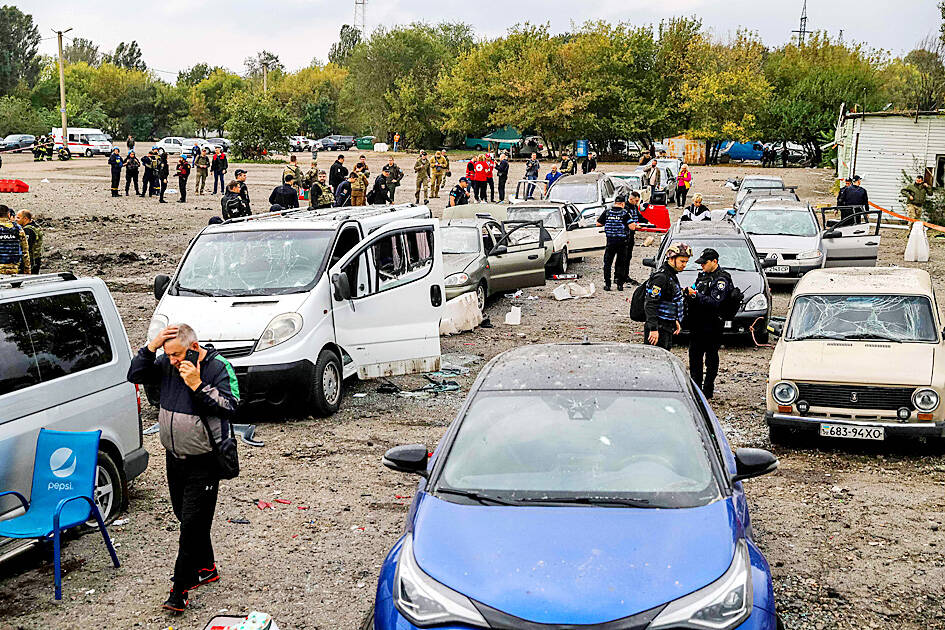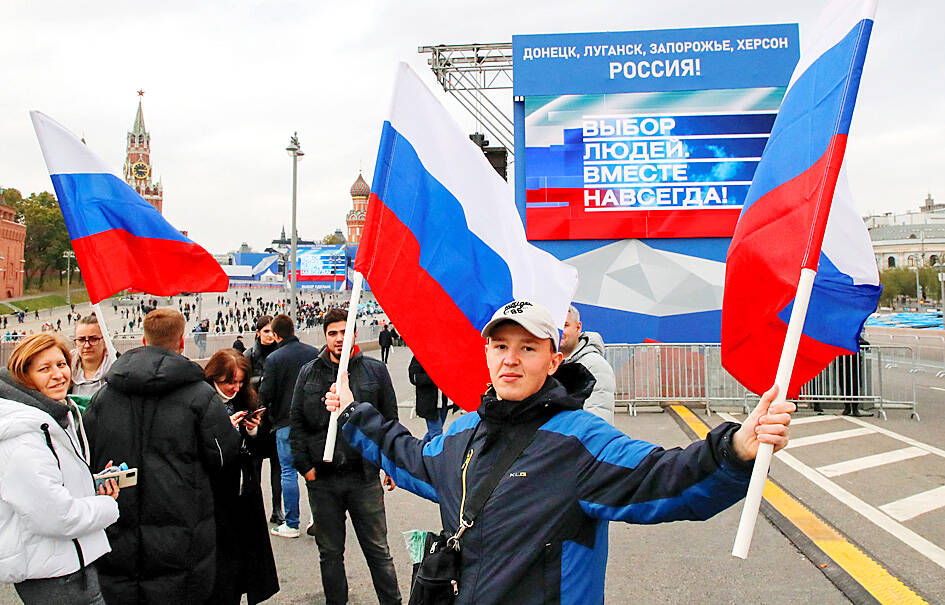Russia had “four new regions,” Russian President Vladimir Putin announced in a speech in the Kremlin yesterday, hours after an attack on a frontline civilian convoy killed at least 25 people near Zaporizhzhia City, in one of the four partly Russian-held region’s of Ukraine that Moscow sought to annex.
Putin has warned he could use nuclear weapons to retain control of those regions — Kherson, Zaporizhzhia, Donetsk and Lugansk.
In Ukraine, authorities said they would launch an investigation into the attack.

Photo: AFP
“Twenty-five killed and about 50 wounded in an attack by the Russian military on a humanitarian convoy in Zaporizhzhia. Investigation launched,” the Ukrainian Prosecutor General’s office wrote on Telegram.
Bodies of people wearing civilian clothes were left on the ground after the attack and windows of vehicles blown out.
“Only complete terrorists could do this,” Ukrainian President Volodymyr Zelenskiy said. “Bloodthirsty scum! You will definitely answer.”

Photo: REUTERS
“The enemy launched rockets on a civilian convoy leaving the city center” Zaporizhzhia Governor Oleksandr Starukh said.
However, Vladimir Rogov, a Russia-appointed official in the nearby town of Enerhodar, accused Ukrainian troops of carrying out a “terrorist act.”
“The regime in Kyiv is trying to portray what happened as shelling by Russian troops, resorting to a heinous provocation,” he said on social media.
Preparations were underway in Moscow’s Red Square throughout the day yesterday for state-organized celebrations to announce the annexation of the four regions.
Workers installed banners saying: “Donetsk. Lugansk. Zaporizhzhia. Kherson. Russia!”
“I’m happy if they want to join Russia,” Natalya Bodner, a 37-year-old lawyer told Agence France-Presse in central Moscow. “They have more hope than we do.”
“It should have been done a long time ago,” Ildar Babaev, a Russian service member from the southern region of Dagestan said. “This is the right decision.”
The four regions create a crucial land corridor between Russia and the Crimean Peninsula, annexed by Moscow in 2014.
However, ahead of Putin’s announcement, the Kremlin had said it “needed to clarify” the exact borders of Kherson and Zaporizhzhia — which are not fully controlled by Moscow’s forces.
Together, the four regions and Crimea make up about 20 percent of Ukraine, whose troops have over the past few weeks been clawing back wins as part of a counteroffensive.
Ukrainian forces are on the doorstep of Lyman in Donetsk, which Moscow’s forces pummeled for weeks to capture this summer.
“Lyman is partially surrounded,” Denis Pushilin, the pro-Moscow leader in the breakaway region, said on social media.
Two nearby villages were “not fully under our control,” he added.
In Sloviansk, a city in Donetsk, a Ukrainian military medic who goes by the name of Coconut said the annexations were nonsense.
“If my neighbor comes to my house and announces that it’s his, nobody believes it actually belongs to him,” he said.
In Taiwan, the Ministry of Foreign Affairs yesterday condemned the elections Russia had held in the four regions ahead of the annexation.
“The government of the Republic of China (Taiwan) solemnly condemns Russia’s ambition to annex Ukraine’s territory through a fake referendum,” it said. “Russia has blatantly violated the UN Charter through its invasion and occupation of Ukrainian territory, which undermines the rules-based international order.”
Taiwan reiterated its position of unanimity with like-minded countries as it refuses to recognize the results of Russia’s referendum in Ukraine, it said.
Taiwan would work with the EU, the US and other democracies to take appropriate countermeasures in response to the elections, it said.
Additional reporting by Yang Cheng-yu

A magnitude 7.0 earthquake struck off Yilan at 11:05pm yesterday, the Central Weather Administration (CWA) said. The epicenter was located at sea, about 32.3km east of Yilan County Hall, at a depth of 72.8km, CWA data showed There were no immediate reports of damage. The intensity of the quake, which gauges the actual effect of a seismic event, measured 4 in Yilan County area on Taiwan’s seven-tier intensity scale, the data showed. It measured 4 in other parts of eastern, northern and central Taiwan as well as Tainan, and 3 in Kaohsiung and Pingtung County, and 2 in Lienchiang and Penghu counties and 1

FOREIGN INTERFERENCE: Beijing would likely intensify public opinion warfare in next year’s local elections to prevent Lai from getting re-elected, the ‘Yomiuri Shimbun’ said Internal documents from a Chinese artificial intelligence (AI) company indicated that China has been using the technology to intervene in foreign elections, including propaganda targeting Taiwan’s local elections next year and presidential elections in 2028, a Japanese newspaper reported yesterday. The Institute of National Security of Vanderbilt University obtained nearly 400 pages of documents from GoLaxy, a company with ties to the Chinese government, and found evidence that it had apparently deployed sophisticated, AI-driven propaganda campaigns in Hong Kong and Taiwan to shape public opinion, the Yomiuri Shimbun reported. GoLaxy provides insights, situation analysis and public opinion-shaping technology by conducting network surveillance

Taiwan is gearing up to celebrate the New Year at events across the country, headlined by the annual countdown and Taipei 101 fireworks display at midnight. Many of the events are to be livesteamed online. See below for lineups and links: Taipei Taipei’s New Year’s Party 2026 is to begin at 7pm and run until 1am, with the theme “Sailing to the Future.” South Korean girl group KARA is headlining the concert at Taipei City Hall Plaza, with additional performances by Amber An (安心亞), Nick Chou (周湯豪), hip-hop trio Nine One One (玖壹壹), Bii (畢書盡), girl group Genblue (幻藍小熊) and more. The festivities are to

Auckland rang in 2026 with a downtown fireworks display launched from New Zealand’s tallest structure, Sky Tower, making it the first major city to greet the new year at a celebration dampened by rain, while crowds in Taipei braved the elements to watch Taipei 101’s display. South Pacific countries are the first to bid farewell to 2025. Clocks struck midnight in Auckland, with a population of 1.7 million, 18 hours before the famous ball was to drop in New York’s Times Square. The five-minute display involved 3,500 fireworks launched from the 240m Sky Tower. Smaller community events were canceled across New Zealand’s